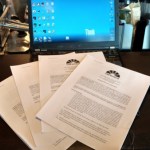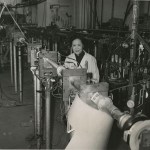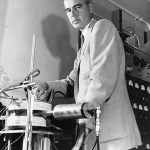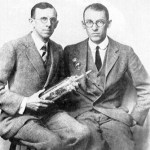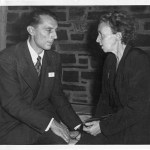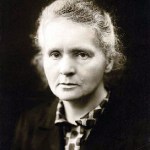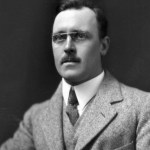Science Books
So, I tweeted about this yesterday, but I also spent the entire day feeling achy and feverish, so didn't have brains or time for a blog post with more details. I'm feeling healthier this morning, though time is still short, so I'll give a quick summary of the details:
-- As you can see in the photo (taken with my phone at Starbucks just before I took these to the post office to mail them), I signed a contract for a new book. Four copies, because lawyers.
-- The contract is with Oneworld Publications in the UK, who had a best-seller on that side of the pond with How to Teach Quantum Physics to…
I forgot to do this last week, because I was busy preparing for SteelyPalooza on Saturday, but here are links to my recent physics posts over at Forbes:
-- What 'Ant-Man' Gets Wrong About The Real Quantum Realm: On the way home from the Schrödinger Sessions, I had some time to kill so I stopped to watch a summer blockbuster. The movie was enjoyable enough, thanks to charming performances from the key players, but the premise is dippy even for a comic-book movie. It does, however, provide a hook to talk about quantum physics, so...
-- Great Books For Non-Physicists Who Want To Understand…
I've been falling down on the job of informing you about promotional events for Eureka, mostly because the pace of these has slackened. But I'll be on the radio today, on WYPR's "Midday with Dan Rodricks" based in Baltimore (I'll be in the usual studio in Albany for this...). This is scheduled for a full hour, 1-2pm Eastern time.
So, if you're in Charm City, tune in. Or listen via the Internet from basically anywhere.
Last week, Steven Weinberg wrote a piece for the Guardian promoting his new book about the history of science (which seems sort of like an extended attempt to make Thony C. blow a gasket..). This included a list of recommended books for non-scientists which was, shall we say, a tiny bit problematic.
This is a topic on which I have Opinions, so I wrote a recommended reading list of my own over at Forbes. I'm more diplomatic about Weinberg than Phillip Ball was, but I have ego enough to say that I think my list is way better...
I won't pretend that it's a truly comprehensive list, though, so…
Kate's a big consumer of audio books, but I've never been able to listen to them. About five minutes in, I doze right off, every time. However, I know there are a lot of folks like Kate who love audio books and listen to them while commuting, so I'm very happy to announce that Audible is now selling an audio edition of Eureka.
This is the first of my books to get an audio edition, which is cool-- we actually sold audio rights to the first one, but I guess after they paid for it, they discovered that it has a whole bunch of pictures that are kind of integral to the book. At least, I'm guessing…
There's a new-ish book review podcast covering pop-science books, BookLab, hosted by Dan Falk and Amanda Gefter, and their latest episode includes my Eureka as the third of three books being discussed (a bit more than 40 minutes in, though their discussion of the other books is also interesting...).
It's sort of an odd experience listening to other people talking about my book; most of the audio I've heard about it is listening to my own interviews, where I'm actively participating (I recorded another radio interview yesterday; not sure when it will air, but I'll post a link). Happily, they…
No, not the little cover .jpg that I use as the "featured image" to tag these posts promoting Eureka. The post title refers to the Big Picture Science radio show from the SETI insitute. I'm one of the people interviewed in the latest episode, Maria Konnikova (author of Mastermind) and Louis Liebenberg.
This is another interview that was recorded remotely down at WAMC in Albany. They pushed back on my stock answers a little more than usual, which in one sense was fun, but was also pretty exhausting, as I was at the lowest point of the cold I'm just getting over now. I went home right after it…
Two new items about Eureka: Discovering Your Inner Scientist:
1) WAMC has now posted the interview I did with Joe Donahue on The Roundtable. This was a fun interview, and covers a number of examples from the book, so I think gives you a really nice sense of what it's all about.
2) There's a review of Eureka in New Scientist, along with two other books. It's fun to see all these different publications do reviews, because every reviewer latches onto a different example to feature. You can almost deduce the entire contents of the book if you read all of the different reviews...
The New Scientist…
"Hey," you say, "It's been, like, a week and a half since you did a post flogging Eureka: Discovering Your Inner Scientist. What gives?" Well, I've been kind of busy, and also the media world sort of goes into suspended animation over the stretch between Christmas and New Year's.
However, there's publicity stuff in the works. Specifically, the interview I recorded with Joe Donahue for The Roundtable on WAMC will probably air today. I'm not sure exactly when-- the show runs from 9am to noon, but I would bet on some time between 10:20 and 11:45, because I'm teaching a class then.
Anyway, it's…
When I launched this back at the start of December, I honestly wasn't sure I would have enough good stories to make it through. I suspected I might end up going a week or two, then quietly letting the whole thing drop. As we come to the end, though, I've run out of days well before running out of stories. There's this one slot left, and a huge number of great stories I could relate-- Pauli proposing the neutrino as an act of desperation, or Cowan and Reines detecting it. The race to split the atom in the 1930's, won by Rutherford's Cavendish Lab. Julian Schwinger's odd work schedule. John…
For the penultimate advent calendar of science stories post, we'll turn to a great experimentalist with a great biography. This story also appears in Eureka: Discovering your Inner Scientist, but it's too good not to re-use.
Chien-Shiung Wu was born in china in 1912, at right around the time education of women was first legalized. Her father founded a school for girls so he could teach her, then at around the age of 10 she went off to a boarding school, and then the best universities in the country, where she distinguished herself as one of the finest math and physics students in China. At…
One of the very best books I ran across in the process of doing research for Eureka is The Second Creation: Makers of the Revolution in Twentieth-Century Physics by Robert P. Crease and Charles C. Mann. It's an extremely detailed treatment of the development of quantum theory, and includes anecdotes that I haven't seen elsewhere. It also does a fantastic job of showing the essential interplay of experiment and theory through the difficult process of developing quantum field theory, which is often underplayed in popular treatments (which tend to be written by theorists, and often treat…
As I endlessly repeat, I'm an experimentalist by training an inclination, so I especially appreciate stories about experimental science. There's something particularly wonderful about the moment when an experiment clicks together, usually after weeks or months of hard, frustrating work, when things just keep breaking.
Of course, sometimes, breaking stuff can be a Good Thing.
Possibly my favorite story from the development of quantum physics involves just such an occasion, around 1924, when Clinton Davisson and Lester Germer at Bell Labs were trying to characterize a nickel surface by bouncing…
Given that I am relentlessly flogging a book about the universality of the scientific process (Available wherever books are sold! They make excellent winter solstice holiday gifts!), I feel like I ought to try to say something about the latest kerfuffle about the scientific method. This takes the form of an editorial in Nature complaining that Richard Dawid and Sean Carroll among others are calling for discarding traditional ideas about how to test theories. Which is cast as an attempt to overthrow The Scientific Method.
Which, you know, on the one hand is a kind of impossible claim. There…
The winter solstice holidays are a time for family and togetherness, so building off yesterday's post about the great Marie Skłodowska Curie, we'll stay together with her family. Specifically her daughter Irène Joliot-Curie and her husband Frédéric. The Joliot-Curies are possible answers to a number of Nobel Prize trivia questions-- only mother and daughter to win, one of a handful of married couples, etc.-- but the scientific story about them that I find most fascinating is that their Nobel was for the third thing they did that could've earned them the prize, after they just missed out on…
There's no way I could possibly go through a long history-of-science blog series without mentioning the great Marie Skłodowska Curie, one of the very few people in history to win not one but two Nobel Prizes for her scientific work-- if nothing else, Polish pride would demand it. She made a monumental contribution to physics through her work on radioactivity (and through being nearly impossible to kill-- while her work on isolating radium made her ill for many years, she outlived an amazing number of her assistants...), and there are a lot of great stories about her.
This series is partly…
"You wanted to see me, Herr Professor?"
"Hans! Yes, come in, come in. Just going over the account books. Frightful amount of money going out of this place."
"Well, radium is expensive..."
"Ha! Oh, and speaking of which-- here's one of the sources. Absent-mindedly dropped the fool thing in my pocket last night when I locked up. Terrible habit, I really must work on that. Had a drawer full of the things in Montreal..."
"Thank you. And you wanted to see me about...?"
"Oh, yes. We have a new student, Hans, and I'd like you to put him to work on the gold foil project."
"Shouldn't he have his own…
Over at Medium, they've published a long excerpt from Eureka: Discovering Your Inner Scientist, that gives a good flavor of what the book's really like. It's about how the process for solving hidden-object games like the classic Where's Waldo books is comparable to the process used by Henrietta Leavitt to revolutionize our understanding of the universe:
There are multiple web sites and academic papers devoted to computer algorithms for locating Waldo within Handford’s drawings, using a variety of software packages, and these are impressively complex, running to hundreds of lines of code and…
"...and take care that all the signatures go in the right way round, eh, James? I was able to soothe Mr. Dance last time, but if another copy comes back to be rebound, M. de la Roche will put you out."
"Yessir."
"A little more care, there's a good lad. Run home, now, we'll see you in the morning." The apprentice scurried off.
The journeyman bookbinder checked again that the shop door was securely closed, pulled his coat tighter against the March chill, and turned to make the short walk to his own meagre rooms. Stuffing his hands in his pockets, he felt the folded pamphlet advertising tonight…
A few items for Sunday morning:
-- First and foremost, in just a few hours from now, I'll be signing books at the Open Door. If you're in Quebec or central Pennsylvania, you better leave now; Boston or NYC, you can have a cup of coffee first. Farther than that, you might try calling them around 11am ET to see if they'll ship you one...
-- The Albany Times Union did a short Q&A with me about the book. This ran Thursday, apparently, but didn't show up on Google, so I only found it this morning when I went to the Times Union site directly.
-- There's a good, thoughtful review in the…
